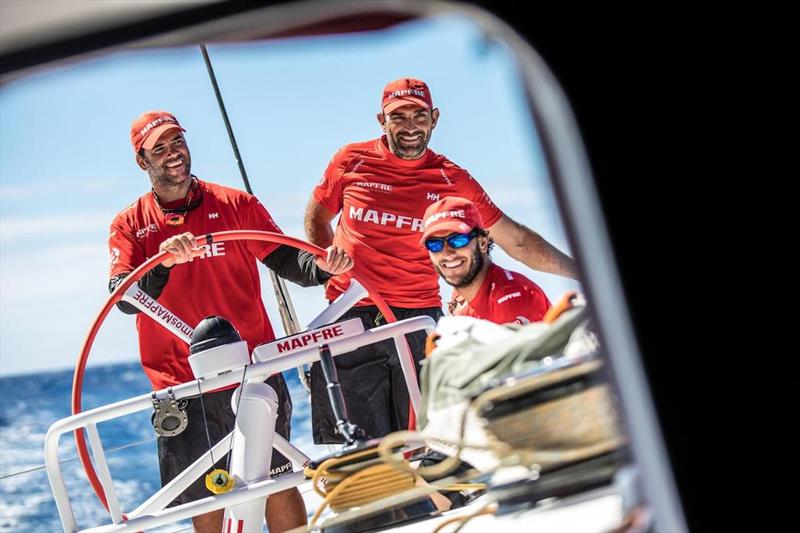
Volvo Ocean Race Leg 2, Lisbon to Cape Town, day 13, on board MAPFRE, Pablo Arrarte, Xabi Fernandez and Blair Tuke laughing - photo © Ugo Fonolla / Volvo Ocean Race
Dear Recipient Name
Some will know this as a Bee Gees or Take That song, and those of a younger generation will know it as a Calvin Harris track; either way, it is vital to making sailing a life-long pastime.
Sailing - both literally and figuratively - is a journey, and sailors go through many stages in the types of sailing they do. Keeping the love of the sport throughout is what fuels the desire to get out on the water as much as possible.
I've often said it before, but feel more than happy to reiterate it: we are incredibly lucky to be involved in such a diverse sport. The range of activities we can take part in on the water is so wide, and the options seem to grow day-by-day. Wingfoiling is one of the latest disciplines to enjoy an explosion of popularity on one hand, and then at the same time shorthanded keelboat sailing is also continuing its meteoric rise.
Even in the same type of boat, the options available are manifold. Take the Merlin Rocket class in the UK as an example, where the fleet enjoys racing nearly every weekend in their Silver Tiller Series, using river, lake and sea locations throughout the country for their venues, has a Nationals with conventional championship courses, yet also has Salcombe Week, where the courses are anything but standard and the fixed startline can be described as 'unpredictable' at best!
For the youth there are so many choices. The keen, and those who are pushed, can go the squad routes, qualifying through their regional events to try and get in their local and national teams. For these sailors, and their parents, weekends are mostly spent getting up early and heading off for the next regatta with the boat on the back of the car, completing a series of six or so races, collecting a trophy if the event goes well, packing up and trying to get some rest before the school week starts, whilst dreaming of taking part in the Olympics.
There are of course only so many places in National teams, and only one team in each class can go on to represent their country at the Games, so there are inevitably those who drop out of competing at the highest level - this is where their love of the sport is essential. If all you know is competition, then the feeling of failure can be all-pervading, leading to leaving the sport altogether. Those who grew up loving sailing, messing about in boats while gradually being introduced to the competitive element, understand how not 'making the grade' isn't failure, it's reaching your own pinnacle, which then leads to so many other of the routes which sailing can provide.
The foiling WASZP class is a great newer example of one of those alternative routes that competitive sailing can provide. It still has the high-level competition at some stunning venues, but has a more relaxed vibe and ethos. Right now, over 170 of them have congregated at Lake Garda, Italy for the WASZP Games. The fleet is colourful and truly international, and the racing is contemporary, starting off with slalom sailing, as well as the more usual windward-leeward courses.
The class is also a great feeder to the International Moth, where the chance to race with the very best is plentiful - including Olympic champions and America's Cup winners- showing that sailors' routes can converge as well as diverge.
Going back to the Merlin Rockets, the same convergence happens. Take a look down the results sheet and you'll see Olympic medallists aplenty, such as Luke Patience and Stu Bithell, mixing it up with mates they grow up with and weekend warriors alike.
What if all you've known is squad racing and you haven't been brought up on throwing seaweed at your friends and seeing how many times you can capsize in a minute? You can find that love for sailing at any point, so don't give up just because someone else made the cut for the Youth Worlds (which also happens to be going on this week at The Hague). Try some of the cornucopia of other opportunities sailing offers us, and find what brings you joy.
Moving to the world of offshore sailing, we've seen an explosion of interest in amateur round-the-world sailing with events such as the Golden Globe Race 2022, starting on 4th September, and the Ocean Globe Race 2023 which will set sail on 10th September next year. Both of these races have had no shortage of entries, although some of the Golden Globe Race competitors have been forced to retire before actually reaching the start line.
| |

|
|

|
| |
The Ocean Globe Race marks the 50th anniversary of the Whitbread Round the World Race, and very much goes back to the roots of what the original event was all about. The Whitbread became more and more professional, subsequently becoming the Volvo Ocean Race, and was the pinnacle of fully-crewed offshore sailing, but now without a headline sponsor just 188 days before the start, The Ocean Race as it is simply known seems to be a shadow of its former self. The website proudly lists fourteen IMOCA teams and seven VO65 teams who have paid the 5000 Euro entry fee, but bar a few teams, news from the event has been scant.
I hope I'm wrong on this, and that the event is a roaring success with all these teams competing and more, but the signs are ominous, particularly with the situation the world is facing right now. The Ocean Race is important for sailing and during its high points has provided incredible exposure to the wider world.
Are sailors and sponsors falling out of love with fully-crewed professional offshore sailing? Is the success of the Vendée Globe taking the limelight? Quite possibly yes to the first question and most definitely the second. You only have to see the effort that goes into the launches of the latest IMOCA designs, such as Charal 2, ahead of the 2024 Vendée Globe to see just how popular the event is, particularly in France.
Sailing is peaks and troughs, highs and lows, ecstasy and agony, as well as a smorgasbord of everything in-between. You can love it at times, and hate it at others, and sometimes just seconds separate the two emotions, but ensure that you have that deep love of sailing which comes from just being out on the water and taking in how lucky we are.
Mark Jardine
Sail-World.com and YachtsandYachting.com Managing Editor
|